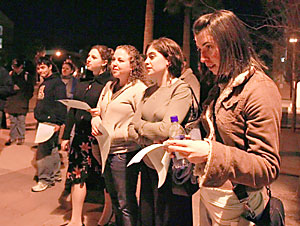 |
|
Chris Coduto/Arizona Daily Wildcat
|
Front to back, communication junior Casie Squires, family and consumer sciences sophomore Megan Lichter, family and consumer sciences junior Davi Novick and elementary education sophomore Alyssa Novick sing during a candlelight vigil for Israeli prime minister Ariel Sharon.
|
|
|
By Stephanie Hall
Arizona Daily Wildcat
Wednesday, January 18, 2006
Print this
Healing songs, prayers lift hopes for ailing prime minister's recovery
Students held a candlelight vigil on the UA Mall last night for peace in the Middle East and for Israeli Prime Minister Ariel Sharon, who remains comatose in a Jerusalem hospital.
About 20 students came to the vigil at the Alumni Plaza to sing a song for healing for the prime minister and recite prayers of peace.
"In light of the recent downfall of Sharon's health, we thought it was important to show our support and solidarity for Israel," said Drew Alyeshmerni, a Judaic studies senior.
Alyeshmerni and her roommates planned the vigil over the winter break, after Sharon suffered a massive stroke Jan. 4, she said. Following several brain operations, the prime minister has yet to wake from a medically induced coma.
"Traditionally we sing the words of 'Mi Shebeirach,' a prayer for the health of Ariel Sharon," Alyeshmerni said as she began the vigil with the traditional healing song. "We pray not only for peace in the Middle East, but for peace in Israel and the Palestinian territories."
Following the healing song, the crowd recited three prayers of peace.
Many Israelis thought of Sharon as a father because of his ability to compromise with the Palestinians, said Bryan Fassman, an undeclared freshman.
"It will be really hard to replace such a great leader," Fassman said. "I pray to God that peace will last."
Aliza Wucher, a theatre arts education junior, said if Sharon dies, the peace negotiations will probably be halted because the state of Israel will be in mourning.
Megan Lichter, a family and consumer sciences education sophomore, said she felt like the vigil was the least she could do from such a distance.
Many of the students came from Jewish organizations at the Hillel Center and in the UA community
"We're very lucky to be part of a large university and to have a very active role on campus," said Wucher, a co-chair of Kedma, a group that plans nighttime Hillel services.
